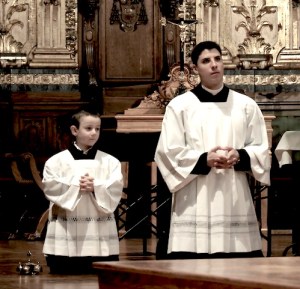 ODAY I asked my 8 year-old-boy what he missed most about going to Church. His answer did not disappoint. He said, “Well, three things actually. First I can’t go to confession. Second, I can’t go to Communion. And I also miss getting the treats after Mass.” Dear reader, a proud Mama, I am!
ODAY I asked my 8 year-old-boy what he missed most about going to Church. His answer did not disappoint. He said, “Well, three things actually. First I can’t go to confession. Second, I can’t go to Communion. And I also miss getting the treats after Mass.” Dear reader, a proud Mama, I am!
“Father, I am hungry; for the love of God give this soul her food, her Lord in the Eucharist.” —St. Catherine of Siena
This intense yearning for our Lord in the Eucharist is not hard to understand; even an eight year old ‘gets it.’ When one truly understands who the Eucharist is, it is hard not to ache for Him. It is hard to maintain an intimate relationship with someone who has been pulled from you. It is hard to fill a spiritual void that can only be filled with our Lamb’s flesh and blood.
Our screens have been filled with virtual Masses and a plethora of communication throughout all of our social media platforms. But at its most basic, personal prayer is what most Catholics probably have clung to as the foundation of their spiritual life in this time of pandemic.
In fact, entire Christian denominations are constructed around an individual’s ability to sustain a life of personal prayer, even communal personal prayer, that is quite different from the ritual liturgy we Catholics live. Perhaps these time have been easier for them: they can watch their pastor’s homily or download the sermon or listen to their “worship band” on stage or stream their playlist.
But for us Catholics it is vastly different. Although personal prayer is imperative in our daily lives and fosters our love for our Lord, it is not all that is needed. Liturgical prayer is needed and must be restored! The Liturgy is ESSENTIAL. It is as vital as the heart is to the body. Pandemic or not, the soul knows that Mass is indispensable!

Fr. Gabriel of St. Mary Magdalen tells us that “a Christian is not isolated…Hence his whole spiritual life, even though it has a personal character which tends toward intimate contact with God, ought also to have a social, liturgical character, which shares in the life of the Church.” In his meditation, he goes on to explain that interior (personal) prayer and exterior (liturgical) prayer “must never be opposed to one another. Rather, they must be united in such a way that the one penetrates and sustains the other. As liturgical prayer should be vivified by personal prayer, so personal prayer should be incorporated into liturgical prayer and nourished by it.” 1
“Some day, we will know the value of suffering, but then we will no longer be able to suffer. The present moment is ours.” St. Faustina
And so we strive to do our best and unite ourselves through prayer as we cry out to the Lord for divine sustenance. We cling to the belief that our suffering will not be in vain and that He will restore Himself to us.
Most Sacred Hear of Jesus, have mercy on us.
Our Lady of Ransom, pray for us.

NOTES FROM THIS ARTICLE:
1 Fr. Gabriel of St. Mary Magdalen, O.C.D., the author of Divine Intimacy: Meditations on the Interior Life for Every Day of the Liturgical Year, was a Discalced Carmelite priest who studied and became an expert in the writings of St. Teresa of Avila and St. John of the Cross, two Carmelite mystics. Towards the end of his life, he became the spiritual director for the Discalced Carmelite nuns of the Monastery of St. Joseph in Rome. With their help, he was able to compile his spiritual reflections and writings. They are, in my humble opinion, deep and profound and great spiritual food.


